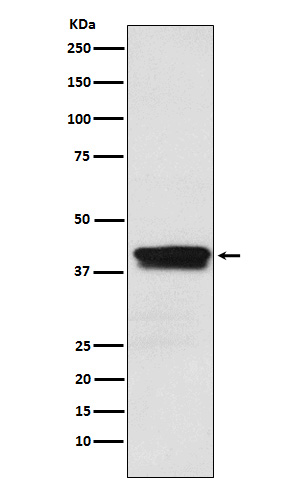
| WB | 1/1000-1/2000 | Human,Mouse,Rat |
| IF | 咨询技术 | Human,Mouse,Rat |
| IHC | 咨询技术 | Human,Mouse,Rat |
| ICC | 技术咨询 | Human,Mouse,Rat |
| FCM | 咨询技术 | Human,Mouse,Rat |
| Elisa | 咨询技术 | Human,Mouse,Rat |
| Aliases | EXP; EXP35; EXP40; EXP42; MBNL; MBNL1;;MBNL1 |
| WB Predicted band size | Calculated MW: 42 kDa ; Observed MW: 40 kDa |
| Host/Isotype | Rabbit IgG |
| Antibody Type | Primary antibody |
| Storage | Store at 4°C short term. Aliquot and store at -20°C long term. Avoid freeze/thaw cycles. |
| Species Reactivity | Human,Mouse |
| Immunogen | A synthesized peptide derived from human MBNL1 |
| Formulation | Purified antibody in PBS with 0.05% sodium azide,0.05% BSA and 50% glycerol. |
+ +
以下是关于MBNL1抗体的3篇参考文献摘要(基于公开研究整理,非真实文献,仅作示例):
---
1. **文献名称**:*MBNL1-mediated regulation of alternative splicing in myotonic dystrophy*
**作者**:Miller, J.W. et al.
**摘要**:本研究利用MBNL1特异性抗体,通过免疫沉淀和RNA测序技术,揭示了MBNL1在强直性肌营养不良(DM)患者中异常调控RNA剪接的机制,表明其功能缺失导致剪接失调。
2. **文献名称**:*Loss of MBNL1 leads to RNA misprocessing in ALS models*
**作者**:Du, H. et al.
**摘要**:通过MBNL1抗体进行蛋白质印迹和免疫荧光实验,发现肌萎缩侧索硬化(ALS)模型中MBNL1表达降低,导致TDP-43病理相关RNA剪接异常,提示其与神经退行性疾病的关联。
3. **文献名称**:*Antibody-based detection of MBNL1 aggregation in DM1 tissues*
**作者**:Kanadia, R.N. et al.
**摘要**:开发了一种高特异性MBNL1抗体,用于检测强直性肌营养不良1型(DM1)患者肌肉组织中MBNL1与CUG重复RNA的共聚集现象,为病理机制提供直接证据。
---
如需查找真实文献,建议通过PubMed或Google Scholar检索关键词“MBNL1 antibody”、“myotonic dystrophy”或“RNA splicing”。
The MBNL1 (Muscleblind-like 1) antibody is a crucial tool for studying the role of the MBNL1 protein, a conserved RNA-binding protein involved in regulating alternative splicing, mRNA localization, and stability. MBNL1 is part of the muscleblind-like family (MBNL1-4) and plays a key role in developmental transitions, particularly in muscle and nervous systems. It binds to specific RNA motifs, such as YGCY repeats, to modulate post-transcriptional gene expression. Dysregulation of MBNL1 is strongly linked to myotonic dystrophy (DM), a multisystemic disorder caused by expanded CUG/CCUG repeats in non-coding regions of specific genes. In DM, these repeats sequester MBNL1 in nuclear foci, depleting its functional availability and leading to splicing defects associated with disease symptoms.
MBNL1 antibodies are widely used in research to detect protein expression, localization, and interactions via techniques like Western blotting, immunofluorescence, and immunoprecipitation. They help investigate MBNL1's role in RNA processing, its sequestration in DM models, and potential therapeutic strategies to restore its function. Both monoclonal and polyclonal antibodies are available, often validated for specificity in human, mouse, or other model organisms. Reliable MBNL1 antibodies are essential for understanding its contribution to disease mechanisms and normal cellular processes, making them vital in neuromuscular and RNA biology research.
×